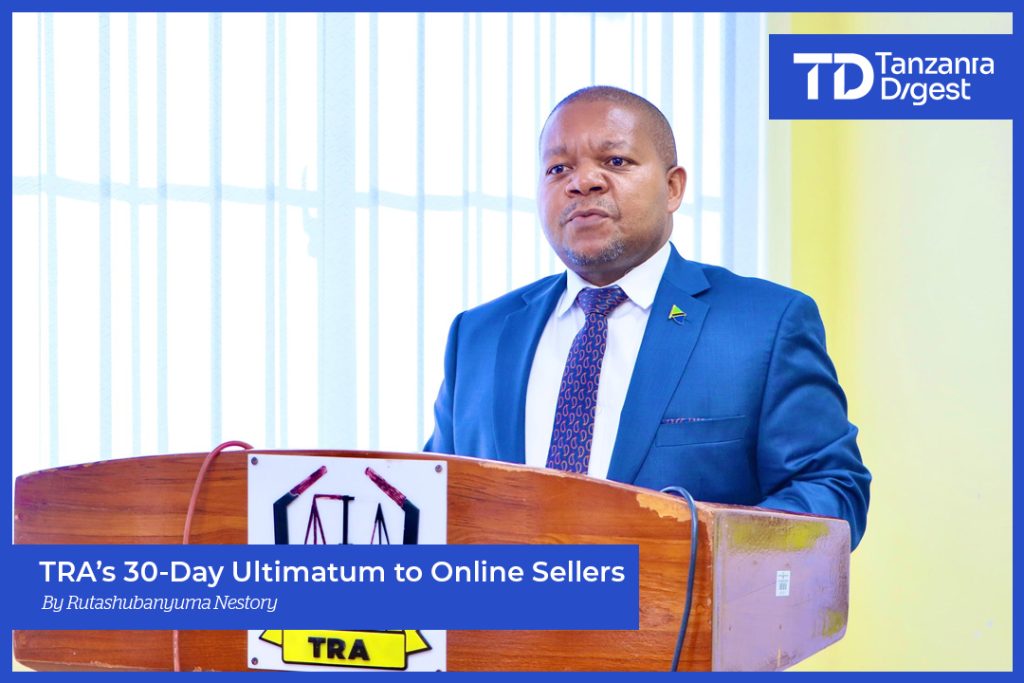Here’s a clear explanation of Tanzania’s tax threshold changes and the rationale behind the strict compliance deadline:
TRA Gives Online Sellers Until Aug 30 to Register or Face Penalties.
1. Clarifying the Tax Thresholds.
TSh 4M Tax Threshold: Why Small Online Sellers Get No Grace Period”.
– TZS 4 Million Threshold:
This is “not a new reduction” but the longstanding minimum for presumptive income tax under Section 35 of the Tax Administration Act (TAA) 2015. Businesses earning ≥ TZS 4 million annually must register with TRA and pay presumptive tax, regardless of profitability.
– TZS 200 Million Threshold:
Applies exclusively to “VAT registration”, not income tax. Registration for VAT is mandatory to every person upon attaining the registration threshold of 200 million in the period of twelve months and above or the person’s turnover is equal to or greater than one half of the registration threshold (100 million) in the period of six months ending at the end of the previous month.
– Misconception Alert:
There is a confusion between VAT thresholds and income tax. Online businesses (including Airbnb) face income tax obligations at TZS 4 million, while VAT applies only if turnover exceeds TZS 200 million.
2. Why No Grace Period? Strict Enforcement Driven by Revenue Gaps.
– Massive Tax Evasion:
TRA estimates only “24% of potential VAT revenue” is collected due to underreporting and informal operations.
Airbnb Hosts in Tanzania Must Register with TRA Within 30 Days”.
Online/Airbnb businesses are flagged as high-evasion sectors.
– Digital Economy Focus:
A 2% Digital Services Tax (DST) was introduced in 2022 for foreign platforms like Airbnb, but local hosts “still evade income tax”. The 1-month ultimatum (Aug 1–30, 2025) aims to force registration.
– Enforcement Tools:
TRA uses Virtual Fiscal Devices (VFDs) for real-time transaction tracking and whistleblower incentives to report evaders.
– Equity Argument:
TRA Commissioner Mwenda emphasizes that online businesses “have not been exempted” like physical businesses, making grace periods unfair.
3. Why Foreign Investors Get Preferential Treatment.
– Investment Incentives:
Tanzania offers tax holidays (5–10 years), capital allowance deductions, and loss carry-forwards to attract foreign capital under the Tanzania Investment Act . These are “strategic concessions” not extended to domestic micro-businesses.
– Administrative Reality:
Foreign investors operate in regulated, trackable sectors (e.g., mining, manufacturing), while online microbusinesses are harder to monitor. TRA prioritizes immediate compliance to prevent revenue leakage.
4. Economic Pressure on Small Businesses: TRA’s Counterarguments.
– Presumptive Tax Relief:
Businesses earning TZS 4M–7M annually pay only TZS 100,000/year if records are incomplete (≈$43/month).
– No Audit Burden:
Businesses below TZS 100 million turnover needn’t submit audited financial statements.
– Data-Driven Approach:
Airbnb hosts in Dar es Salaam average “$8,000/year revenue” (≈TZS 20 million), well above the TZS 4 million threshold. TRA views this as proof of capacity to pay.
5. Potential Mitigations for Struggling Businesses.
– Phased Penalty System:
While TRA rejects grace periods, first-time offenders may negotiate penalty waivers if they promptly comply.
– Digital Tools:
TRA’s e-filing portal reduces compliance time/costs.
– Sector-Specific Rates:
Ride-hailing drivers pay only TZS 350,000/year under presumptive tax, demonstrating scalable burdens.
Key Takeaway:
TRA’s rigid stance stems from systemic revenue losses in the digital economy and existing reliefs (low presumptive rates, no audits for small firms).
While microbusinesses face genuine challenges, the 1-month deadline reflects a policy choice to prioritize broad compliance over individual hardship. Foreign investor incentives remain separate as strategic economic tools.
Tanzania’s Online Tax Push: Enforcement Hurdles at the TSh 4M Threshold.
1. Tanzania’s Online Tax Crackdown: Can TRA Enforce the TSh 4M Threshold?”
Highlights:
– Questions feasibility of monitoring micro-transactions.
– Spotlights the ambitious 1-month deadline for compliance.
2. Tracking Airbnb to Alibaba: TRA’s Uphill Battle to Tax.
Tanzania’s Digital Economy.
Highlights:
– Enforcement complexity across platforms (local/global).
– VFD system limitations in capturing informal/off-platform payments.
3. The TSh 4M Tax Trap: Why Tanzania’s Online Sellers May Slip Through TRA’s Net.
Highlights:
– Digital literacy gaps:
Small sellers struggle with e-filing/VFDs.
– Whistleblower reliance:
Weakness of citizen reporting as an enforcement tool.
– Resource constraints:
TRA’s capacity to audit thousands of microbusinesses.
4. Virtual Tax, Real Problems: Tanzania’s Struggle to Police Online Revenue.
Highlights:
– Contrast between digital transactions and TRA’s physical enforcement capabilities.
– Risks of underreporting via cash payments or foreign platforms.
5. Beyond Deadlines:
Why TRA’s 30-Day Online Tax Order Faces Enforcement Headwinds.
Highlights:
– Data gaps:
Identifying unregistered sellers without third-party platform cooperation.
– Compliance costs:
VFD adoption burdens for subsistence-level traders.
– Cross-border evasion:
Tracking income routed through offshore accounts.
Key Enforcement Challenges Embedded in the Article:
| No. | Challenge. | Why It’s Difficult. |
| 1.0 | Platform Cooperation. | Airbnb/foreign sites may resist sharing user data; local apps (e.g., *Wasoko*) lack integration with TRA systems. |
| 2.0 | Transaction Visibility. | Cash payments, peer-to-peer transfers, and off-platform deals evade VFD tracking. |
| 3.0 | Scale vs. Capacity. | TRA has ~3,000 staff to monitor 500k+ potential taxpayers; manual audits are impossible. |
| 4.0 | Digital Exclusion. | Rural/elderly sellers lack devices or skills to use e-filing/VFDs (only 26% of Tanzania has internet access). |
Read more analysis by Rutashubanyuma Nestory

